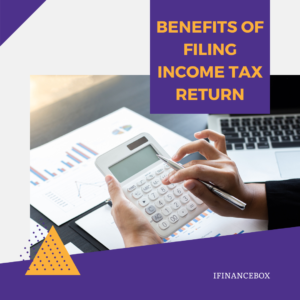The act of filing income tax returns stands as a pivotal thread that weaves together legal compliance, financial opportunity, and long-term security.In the following exploration, we will unravel the narrative of five profound benefits that unfold when one takes the proactive step of filing income tax returns. Far from being a mere bureaucratic chore, this practice emerges as a strategic maneuver that not only aligns us with the law but also opens doors to a spectrum of financial advantages, ranging from immediate refunds to securing a robust financial legacy.

Join us on this journey as we uncover the layers of significance behind the act of filing income tax returns and unveil the profound impact it can have on one’s financial trajectory.
The Top 5 Benefits of filing Income Tax Returns
Legal Compliance and Peace of Mind
Stepping into the realm of financial responsibility involves a fundamental adherence to the law. Tax codes, with their nuanced variations from one country to another, demand a vigilant understanding. Timely and accurate filing of income tax returns not only positions individuals on the right side of the legal spectrum but also bequeaths a profound peace of mind. Evading legal entanglements and circumventing potential penalties emerges as a cornerstone benefit for those committed to being conscientious taxpayers.
Access to Financial Services
The repercussions of filing income tax returns extend far beyond the immediate horizon, significantly impacting one’s financial trajectory. Financial institutions, the gatekeepers to loans, credit cards, and mortgages, often scrutinize tax returns as part of their evaluation process. A consistent history of filing tax returns becomes a testament to financial stability and responsibility, rendering individuals more attractive to favorable terms and interest rates. This advantage proves especially consequential in pivotal financial decisions, such as acquiring a home or launching a business.
Claiming Tax Refunds and Credits
At the heart of the tangible benefits derived from filing income tax returns lies the prospect of receiving a tax refund. Governments, recognizing the role of citizenry in driving specific behaviors, offer deductions and credits to incentivize actions like homeownership, education pursuits, and charitable contributions. Filing tax returns becomes a strategic move, ensuring individuals capitalize on these opportunities. To overlook potential refunds or credits is to forsake financial resources that could otherwise be channeled towards savings, investments, or other crucial financial goals.
Building a Financial History
Much like a credit score narrates one’s borrowing history, an income tax return history serves as a narrative thread within the broader financial tapestry. A consistent and accurate record of tax returns paints a comprehensive picture of financial responsibility over time. This financial history proves invaluable in diverse scenarios, from employment opportunities to building trust with financial institutions. Employers, in their hiring processes, often consider a candidate’s tax return history as a measure of reliability and commitment to financial accountability.
Social Security and Retirement Benefits
Filing income tax returns takes on an added significance when contemplating future security, particularly concerning social security and retirement benefits. Contributions made through income tax are intricately tied to these long-term financial safety nets. Regular filing not only ensures the construction of a solid foundation for retirement but also requires an understanding of the tax implications associated with diverse retirement savings vehicles like 401(k)s and IRAs. This knowledge empowers individuals to make informed decisions that maximize their retirement income.
FAQS
Why is it essential to file Income Tax Returns (ITR)?
Filing ITR is vital as it ensures adherence to tax laws and showcases financial responsibility.
When is the deadline for filing Income Tax Returns?
Deadlines vary by country; for instance, it’s typically around April 15th in the United States and July 31st in India.
Can I complete my Income Tax Returns online?
Yes, most tax authorities provide online platforms for the convenient and efficient filing of ITR.
What are the consequences if I miss the deadline for filing ITR?
Missing the deadline may result in penalties and interest charges, emphasizing the importance of timely filing.
Are there advantages to filing ITR even if I don’t owe any taxes?
Yes, filing ITR is beneficial for claiming refunds, accessing tax credits, and establishing a positive tax history.
How can I track the status of my filed Income Tax Returns?
You can check the status online through the official tax authority’s website or use designated mobile apps.
What documents do I need to file my Income Tax Returns?
Commonly required documents include a PAN card, salary slips, bank statements, and investment-related documents like Form 1099.
Can I file ITR if I have income from multiple sources?
Absolutely. ITR forms are designed to accommodate individuals with diverse income sources.
What are the consequences of providing inaccurate information in my ITR?
Providing inaccurate information can lead to penalties, legal consequences, and a loss of credibility with financial institutions.
Is it possible to rectify errors in a filed ITR?
Yes, many tax authorities allow amendments and corrections to be made within a specified time frame after filing.
Conclusion
In essence, the act of filing income tax returns transcends the mere fulfillment of a legal obligation. From unlocking access to financial services and claiming rightful tax refunds to crafting a robust financial history and fortifying one’s future, responsible tax filing stands as a beacon of financial empowerment. As an adept content creator, I underscore the need to perceive income tax returns not as a burdensome task but as a strategic maneuver that contributes significantly to one’s overall well-being. Embracing this perspective ensures not only compliance with the law but also paves the way for a more secure and prosperous financial future.










